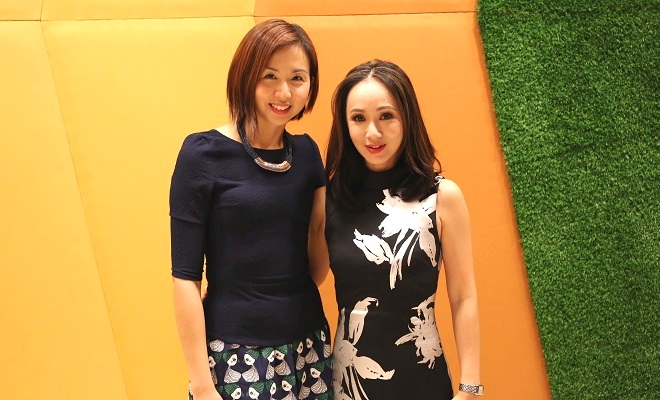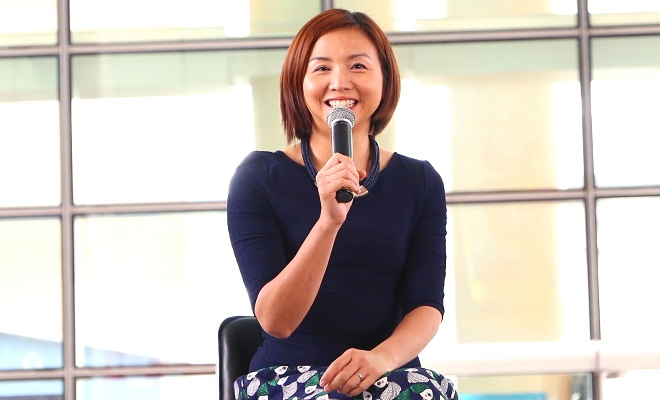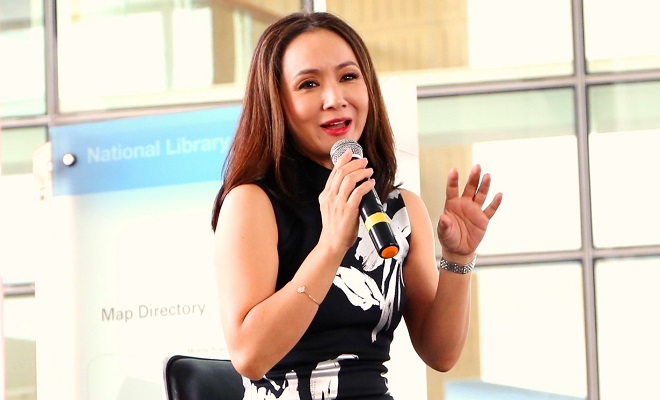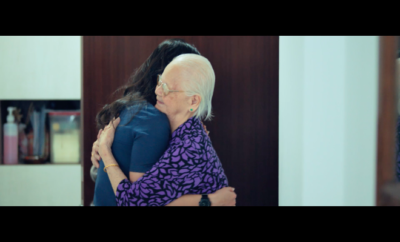 Keegan Gan
Keegan Gan
Insights + interviews
In Conversation With Evelyn Tan And Diana Ser
Our editor recently had a chat with Evelyn Tan and Diana Ser as they shared with us more about their parenting styles when it comes to their children’s online behaviour.
For parents in the digital age, one of the most ever-present concerns is Internet safety. How can you keep your children safe online? Today, this means protecting their identities and helping them avoid mistakes that will have lasting consequences, especially when children are becoming exposed and involved with social networking at much earlier ages. There are so many suggestions going around these days; installing safety software? Have regular conversations with your children? Or limit online time? Which method is right for you and your family? Find out more as Evelyn Tan (ET) and Diana Ser (DS) share with us some parenting tips with regards to online usage.
AA: Hi ladies, thank you for your time, to kick things off can you tell us what’s your most important tip for parents to keep their children safe online?
ET: I believe that there are software and online filters that you can use to monitor your child’s usage of the computer and the websites that they visit, with some of them being free, and that in my opinion would be the first line of defense. Just a quick research should be able to turn up some good results.
DS: My eldest son is nine years old, so I think I need to get started on some form of parental control as well. At the moment I still don’t have the parental control or filtering software, I know some of it comes free, so I really need to install that, that’s top of my list. Second, would be to put our computers where I’m able to see what they are up to. Third, will be really to limit, which will be getting harder and harder because as they progress on to higher level of learning which I look forward to because it’s going to broaden their minds, as some of their school work may require them to do research, in which the most obvious thing will be on the internet, and you really can’t be supervising all the time. So I think the software is going to be very important and also to work with them to understand about their responsibility.
AA: So how can my child cultivate healthy media usage habits?
DS: I think we’ve got to start from young. For example I have a buffet of different types of media avenues that we use with the kids, rather to just rely on a one avenue. So it’s not just hand phones or computers, it’s everything. I use podcasts, that don’t require them to use their eyes and sometimes when you just listen, you learn in a very different way.
ET: Well, I think education is required, as you’ll need to educate your child on the proper usage, and working with them from a very young age is important. When communication lines are open, you will be able to discuss with them some of the issues that are prevalent out there, such as cyber-bullying. So they’ll know what they are getting themselves into. Like Diana said, more and more children are going to be demanding more from the parents as they grow, and the society will expect them to be using internet more independently. We cannot be there always supervising them. So getting them to understand the rules and some of the principles that pertains to the usage of internet is important. I think this is very broad in terms of healthy media usage habits, I think you’ll also need to cultivate in them healthy habits, such as care of eyes and posture when you are sitting in front of the computer. It has got to be a more comprehensive approach that involves safety on the internet, healthy media usage and personal well being.
AA: How savvy do you think parents are when it comes to safe-guarding children online? Do you think it’s too easy for children to stumble across inappropriate things online like radical religious indoctrination, pornography, violence and scams?
ET: I’ll put a disclaimer to say that whatever I’m sharing here is maybe not totally current, as I’m also learning. The digital landscape as we all know is changing all the time and the minute you think that you got it all covered and assume that you are able to be the protector, and all of a sudden something that might jeopardise your child’s safety on the internet crops up. So I think it’s very important for us to just realise that because it is ever changing in this digital age, you’ll need to equip yourself and be really to learn continuously in order to just continue educating and working with your child. If you ask me, I think some of us, especially those with older children; we’re migrants to this digital landscape. Personally I’m not very digitally savvy, but because of the need to parent my children effectively in this new digital landscape and this new digital age, I feel that I’m being pushed, and I’m pushing myself to do better as a digitally savvy person, parent.
DS: Let’s put it this way, I think there’s a lot more to be done still, to teach parents about this digital savviness, hence this whole campaign on information literacy. Information literacy is pretty broad, and as I’ve mentioned earlier it’s a life skill. It’s about how they are going to harness that knowledge and how they are going to harness that technology and not let the technology make use of them. It’s for them to make use of and we need to empower them with the skills and with the knowledge to make use of that information. So I suppose to summarise, I feel that there is a lot of work to be done, certainly in myself.
AA: With stories of cyber-bullying in media and reports of underage use of adult social sites like Facebook and Instagram, how vital do you think it is to educate parents on the importance of implementing safety measures for online browsing?
DS: Regarding the usage of adult social sites such as Facebook by children, I think some software will be able to block these sites. I think those things really have to be in place and I don’t think parents can do this alone, to be honest with you. As children spend a good part of their time in school when they are in their primary school system, I think what we can do is to work very closely with the school so that the school can observe. Like my son, he is in a boys’ school, and in school the teachers really can observe what’s happening with them, the behavior that they are exhibiting, and what the boys talk about. So as long as the teachers are there to flag something up to us, then we can work closely with the school on things such as internet usage, especially when it comes to social media sites.
ET: I think maybe more can be done to let parents be aware of the issues of cyber-bullying. I know the Media Development Authority and the National Library Board have been working on amazing campaigns, coming up with posters and other collaterals such as pamphlets and brochures to address this issue of cyber-bullying. Having done that, the next step is to equip the parents with skills like putting on filters and parental controls to limit or restrict certain websites, but having said that I want to say that, in this age and time where parents are very busy with work and we look upon our electronic
device as a nanny, we are cutting down lesser and lesser time with communicating with our children, talking to them about things that are so important, especially in this digital landscape that they are entering to do their school work research as well as socialise. I think parents need to be aware that the reason why children are bullied, be it in cyberspace or school is because they do not feel that, they can communicate with people physically, and that can create an issue of the child having problems with his or her esteem. So a good, a strong parent-child relationship is so important, which is why as parents, whether it is to stop cyber-bullying or to prevent them from stumbling upon undesirable websites online, we’ll need to build on that very fundamental relationship between parent and child, and when everything is in place, a child who is esteemed, who feels good about him or herself, when cyber-bullied, they will definitely speak to a person of authority to seek redress and not take it lying down and be bullied.
AA: Last and final question, so how can someone be a digitally savvy parent?
DS: I think as parents, we’ll need to teach our children that there are many different perspectives out there, it’s only human nature to only look for the perspectives that we are comfortable with, to look for the ones that we agree with, but I would always encourage them to consider two sides of the coin and then make your decision based on the values and beliefs of your family. Particularly in this digital age where there is a deluge of information, you need to be anchored to your personal values and beliefs in order to make decisions, because you have to harness that information. So this S.U.R.E. campaign, the four things that we have been talking about (Source, Understand, Research and Evaluate), is an easy way for parents to be aware of the pros and cons of the internet, and once you’re aware of it, then you can navigate from there. It’s however not something that can be done overnight; as parents we have to basically adopt and internalise before we can pass it on to our children.
ET: The S.U.R.E. campaign has given us parents a very good platform to have their mind wrapped around this whole thing of “We are in this age and time where we need to be current to keep up”. There are dangers lurking out there, but with knowledge and application they are all manageable. As parents, we need to be ready to dive into this digital age, not to readily embrace everything that is available online but to check, counter check and assess the information and platforms at hand whether they are in line with your values or not, or whether these are things that you are comfortable in allowing your children to view or use. One of these is my daughter’s Instagram account; personally I don’t use it because I just find that it’s so time-consuming. I already have a Facebook account, and if I were to have other social media accounts, the question is, how many things do I need to check every night before I go to sleep? And this is not how I want to end my day. But I’m concerned about what are the potential hazards a child can encounter having an Instagram account. So I did my research on what this whole Instagram is all about and what are some things I need to look out for, check whether there are any controls I can set in order to prevent unnecessary and unsolicited attention on my girl’s account.
AA: What are the top things that parents need to highlight to their children and to educate them about not saying or sharing online?
DS: My kids are not doing anything yet, but I think my rule of thumb would be this, what you wouldn’t say to that person in real life, you mustn’t do that online. Because for example, if you don’t like boy A, and you think that he is a – *whatever unsavoury names kids would use these days*, they may think that it is perfectly okay to do it online, but it’s not, because these things are viral and they spread very fast. So I think the first thing I would really do is to say that it’s not that different from talking to that person, and whatever that you choose to post, read it aloud to yourself; and if it sounds wrong, it’s probably wrong and you probably should reconsider saying it.
ET: Well, I think you know the generation before us really does it quite well. You know back then, my parents, they would often at times remind us to be wary of strangers, and to always be vigilant and look out for danger, so much so that there is an awareness that we should never readily trust someone, especially when it is a stranger. And as parents, we want our children to grow up in a world where they feel that it’s a relatively safe world, hence I feel we should educate our kids about the potential dangers online such as scams. We need to know what are children are doing, and we can put in parameters, and let them know what are the things they can or cannot do. For example, earlier I shared that my daughter want to have her own Instagram account, and there was an unknown request that came in, and she wanted that person to be in her list of friends, so I asked her what’s the very purpose of her setting up the Instagram account in the first place, “She told me that she wanted to share photos with her friends so my reply was, “Is this person your friend?” So I think you have to be very clear with your children on what they want to get out of every activity they are doing online, and after talking to her, she then realised that “Oh ya this is not my friend, but I want to add him so that he can add one more like and then I have more Likes and a bigger following and it’s good to have a big following.” So clarifying some of their intents and purposes for using these platforms for social interactions will help greatly.
*Ed’s Note: Here are some tips to help you connect with your child or grandchild.











